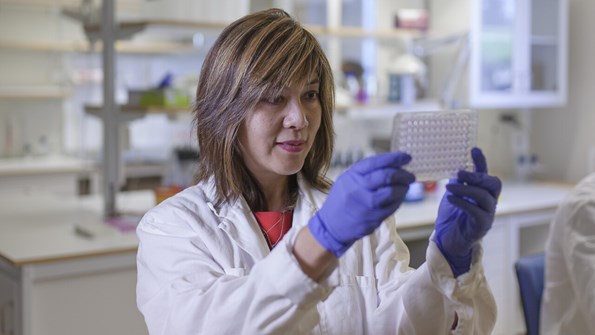
Image: Mattias Pettersson

Image: Mattias Pettersson
We need a greater understanding of the molecular mechanisms behind the spread of cancer. Basic research is also called lab research or preclinical research.
It is well known that normal cells can transform into cancer cells and cause death in cancer patients in different ways. However, we still lack knowledge about many key features, molecular compositions and dynamics of cancer cells, and it is still not clear how cancer cells, at a late stage, can rapidly cause death in patients who are suffering from metastatic diseases.
The focus of basic cancer research is to provide answers to these fundamental questions and to gain a deeper understanding of the mechanisms that drive cancer cell to mutate, grow, survive and become lethal. Additionally, basic cancer research may pave the way for significant advancements in translational and clinical research.
At Umeå University we have a long tradition of engaging in high quality basic cancer research and building on our extensive expertise in molecular genetics, microbiology, stem cell biology, immunology and signaling transduction and drug discovery, many research groups cooperate and complement each other. For instance: we study the gene mutation profiles and signaling cascades in cancer formation and cellular mechanisms in cancer metastasis; we tackle the fundamental and unsolved problems on how bacterial toxins may have effects on tumorigenesis and if bacterial toxins might be exploited as an alternative cancer therapy; we use innovative tools and models to characterize the genetic and epigenetic mechanisms that can distinguish DNA and RNA of normal cells from those in cancer cells; we engage in unique front line studies to understand the molecular mechanism that modulate the interaction between cancer and immune cells during cancer progression; we investigate the molecular action of the drug targets and anticancer drug.
Furthermore, we have built strong research networks and state of the art infrastructures, such as single cell sequencing facilities, artificial intelligence-based computation models, bioinformatic models and protein structure modeling core facilities and advanced imaging core facilities to assist our research and discovery.
The knowledge that is obtained from our basic research will be used to improve existing treatments and potentially make it possible to develop new treatments that targets these deadly diseases.

Professor Jenny Persson sees great opportunities for AI in the field of medicine.